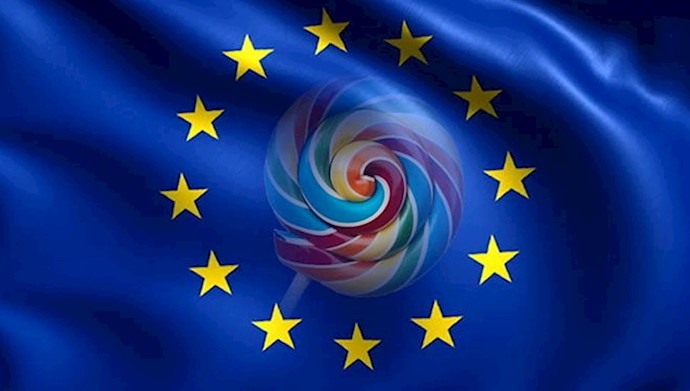Analysis by PMOI/MEK
Oct. 10, 2018 – While in less than a month United State’s second round of economic sanctions will start, Europe’s countermeasure initiative is in doubt.
The much touted “Special Purpose Vehicle” is Europe’s means to bypass additional US sanctions against the Iranian regime. The regime has repeatedly warned that it will not remain in JCPOA if the Europeans don’t deliver on their promises.
The second round of US sanctions will target the Iranian regime’s oil and petrochemical exports, a banking system, and maritime shipping. In essence, any company that interacts with the regime’s energy sector in any way will be banned from the US market. So, companies have to choose which market is more lucrative to them.
In an interview with Aljazeera news network released on October 5, Javad Zarif said that "Iran has given the Europeans some time because they asked us for some time to try to compensate for US departure from the nuclear deal.” He added, "That means that Iran needs to receive the economic dividends of the deal."
On October 5, Iran’s first news network broadcasted a report about Javad Zarif’s interview and stated that “Iran won’t be the only party committed to the JCPOA.” Referring to Europe’s Special Purpose Vehicle, the report also quoted Zarif saying that “in the next phase, we have to see whether the private sector will also welcome such solutions and will enter them or not?… We won’t accept being the only party committed to the deal.”
Zarif’s comments betray his regime’s serious doubts about the effectiveness of Europe’s mechanism for circumventing US sanctions.
Commenting on Europe’s plans to evade the new Iran sanction, The New York Times wrote on October 4: “Perhaps the biggest challenge to the European effort is that large Western companies won’t need the payment entity because they simply won’t be doing any business with Iran. Scores of multinational companies pulled away from Iran after the United States withdrew from the nuclear deal and won’t want to risk penalties.”
Three days later, Javan, a newspaper close to the Revolutionary Guard’s Basij forces, wrote referring to the New York Time’s article: “Zarif’s emphasis that if the mechanism is not functioning, Iran will leave the JCPOA, shows that even the most optimistic Iranian politician about the prospect of cooperation with Europe can’t hide his concerns about Europe’s financial mechanism.”
In fact, earlier last month, Reuters reported that Europe’s attempt to circumvent the sanctions are futile. According to European diplomats, “The European Union has failed to design a workable legal shield for its companies in Iran to beat the global reach of the US financial system and defy President Trump.”
“Europe’s plan is mostly symbolic. Instead, Europe is engaging with Russia and China to show that it is at least searching for ways to ensure Tehran gets some benefits from its oil sales so Iranian President Hassan Rouhani has a reason to keep to the accord,” Reuters adds.
But more important than economic incentives are major national security concerns that may have swayed some of the Iranian regime’s top allies.
Tehran’s recent failed attempt to attack Iran opposition’s grand gathering in Paris lead to an international fiasco that will gravely impact the coming events.
Reuters reported last week that according to a French diplomatic source, the French intelligence concluded that Iran’s intelligence ministry, which is controlled by Supreme Leader Ali Khamenei, ordered the attack on PMOI’s rally near Paris in June.
“Behind all this was a long, meticulous and detailed investigation by our (intelligence) services that enabled us to reach the conclusion, without any doubt, that responsibility fell on the intelligence ministry,” the source said.
France’s response was swift: asset freezes. An internal French foreign ministry memo in August had already told diplomats not to travel to Iran, citing the earlier Paris bomb plot.
By saying that he doesn’t intend to force French companies to stay in Iran, France’s Macron also tried to curb Iran’s economic expectations from the European mechanism while putting the responsibility on the private sector. Earlier this year, Macron said that, he is “the President of the French Republic, not the CEO of Total,” referring to the country’s largest oil company.
German’s Angela Merkel also warned earlier about creating the illusion that Europe can offset the Iran sanctions.
Meanwhile, the latest estimates by Reuters reveal that Iran exported no more than 1.1 million barrels of oil in the first week of October. That is a whopping 500,000 barrels short of the Iranian regime’s daily oil exports of 1.6 million barrels for April when the US first announced its exit out of the Iran deal.
While the current Iran export is much lower than analysts have predicted, some experts believe that in November, when the sanctions strike, Iran’s exports will further decrease to 800 thousand to one million barrels a day. It’s worthy to note that in 2015, at the peak of the sanctions, Iran’s oil export was short of one million barrels a day. But back then, it took nearly three years to reduce Iran’s exports to that level.





